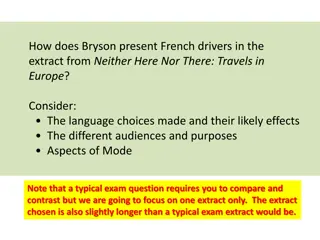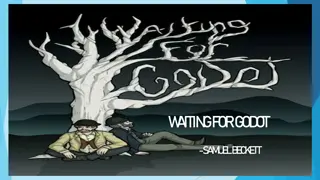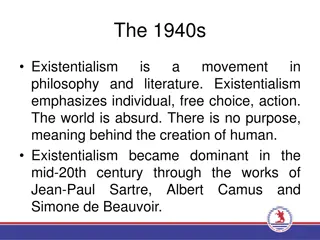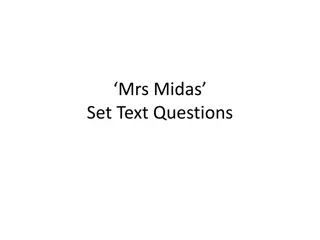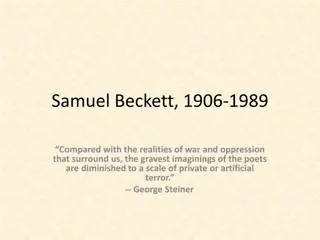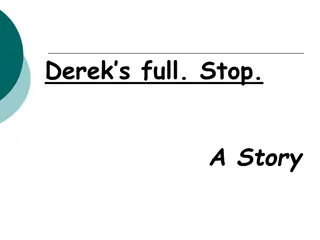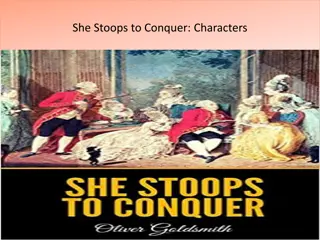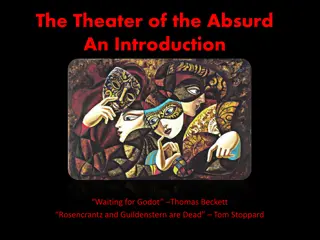Bryson's Depiction of French Drivers in "Neither Here Nor There
In the extract from "Neither Here Nor There," Bryson humorously criticizes French drivers and their chaotic behavior in Paris. He describes the overwhelming traffic, hazardous driving attitudes, and historical stereotypes of French driving incompetence. Through witty language choices, Bryson conveys
1 views • 10 slides
Insights into Manik Bandopadhyay’s Works and Ideologies
Manik Bandopadhyay, an eminent Indian writer, delved into the complexities of human psyche and societal issues in his novels and short stories. Influenced by Marxist philosophy and Freudian principles, he portrayed ordinary individuals enduring extraordinary circumstances during the colonial era. Hi
4 views • 11 slides
The Life and Works of Samuel Beckett in "Waiting for Godot
Samuel Beckett, born in Dublin, Ireland in 1906, was a renowned writer known for his novels, short stories, and iconic plays like "Waiting for Godot." This tragicomedy masterpiece explores the human condition through themes of waiting and absurdity. Beckett's writing style, influenced by modernists
0 views • 17 slides
Literary Movements in the 1940s and 1950s: Existentialism to Angry Young Man
Existentialism emerged as a dominant philosophy in the 1940s, emphasizing individualism and the absurdity of the world. Writers like Samuel Beckett and Iris Murdoch explored these themes in their notable works. In the following decade, the Angry Young Man Movement took hold, challenging societal nor
2 views • 12 slides
Analysis of Poetic Techniques in "Mrs. Midas" Verses for Mood Creation
Late September in "Mrs. Midas", the use of poetic techniques such as personification, contrast in consonant sounds, and building tension through language effectively conveys the relaxed atmosphere changing to chaos. The language choice in building up to the climax adds to the absurdity and horror of
1 views • 9 slides
Insights into Samuel Beckett's Existential World: A Reflection on Language and Despair
Delve into the poignant world of Samuel Beckett, exploring themes of existential despair, the futility of language, and the human condition through his renowned works like "Waiting for Godot" and "Endgame." Through introspective quotes and character sketches, this exploration offers a glimpse into B
0 views • 10 slides
Allegorical Representation of GDR Oppression in "Stasiland
The imagery in "Stasiland" delves into the symbolism of GDR oppression through cultural artifacts like The Lipsi dance, revealing the manipulative propaganda tactics of the regime. Funder's portrayal of the dance reflects the mechanical nature of the Stasi, shedding light on the absurdity of GDR ide
0 views • 11 slides
Derek's Surreal Day: A Story of Familiar Strangeness
Derek wakes up to a bizarre day where he eats his cat, only to find it playing in his cereal bowl. As he navigates through peculiar events involving his family members, the day unfolds with a surreal twist, blending reality with absurdity.
0 views • 19 slides
She Stoops to Conquer: A Comedy of Manners Analysis
She Stoops to Conquer is examined as a Comedy of Manners, satirizing upper-class customs with a focus on human vices and absurdity. Goldsmith's love for this genre is evident in the play's elements, such as the Three Pigeons scene and mockery even in high-bred characters.
0 views • 5 slides
Exploring the Theater of the Absurd: An Introduction to Existentialism in Drama
Delve into the intriguing world of the Theater of the Absurd, a significant theatrical movement of the 1950s rooted in Existentialist philosophy. Discover the essence of Absurdism through illogical plots and characters grappling with the absurdity of existence. Learn about key existentialist concept
0 views • 25 slides
Exploring Gender Inequality Through Aphra Behn's "On Loving Two Equally
Aphra Behn's poem "On Loving Two Equally" serves as a satirical critique of the gender inequality of her time, highlighting the disparities in social censure towards men and women who engage in extramarital relationships. Through the use of humor and juxtaposition, Behn challenges societal norms and
0 views • 4 slides
